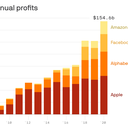The techlash is a bust

After three and a half years, the U.S. backlash against tech's biggest firms has failed to dent or daunt them.
The big picture: Today, Google, Apple, Amazon and Facebook are massively richer, more powerful and more determined to push their products and services deeper into our lives than they were in January 2018, when Axios first used the term "techlash."
Since then, the companies have run a gauntlet of withering criticism and government complaints that they violate users' privacy, dull kids' brains, cheat their competitors, and undermine American democracy.
- Their CEOs have regularly trooped or Zoomed to Capitol Hill, with Mark Zuckerberg alone appearing a half-dozen times for countless hours of "I'll get back to you on that"s.
- They have been sued as monopolists by the Department of Justice and coalitions of states (Google) and by the Federal Trade Commission (Facebook) as well as by the European Union on multiple fronts.
- They have had to pay a variety of record fines, including Google's $5 billion EU antitrust fine and Facebook's $5 billion Federal Trade Commission penalty in 2019. (Shareholders were delighted it wasn't bigger.)
- They have infuriated politicians on both sides of the U.S. partisan divide — conservatives believe they've been censored, and progressives believe social media promotes misinformation.
- They have been painted as villains in a popular documentary ("The Social Dilemma"), on "60 Minutes," and in countless cover stories and books.
Yes, but: So far the assault has barely scratched these companies' gleaming confidence.
- Some, particularly in the social media sector, have taken a reputational hit from 3 1/2 years of this assault.
- But their profits are up across the board and they sit on massive hoards of cash.
- They are barreling ahead with acquisitions and new projects as if all the investigations and lawsuits weren't happening.
And, crucially, the nonstop barrage of high-profile CEO hearings and scathing reports has so far failed to produce any significant new law reining in tech's power.
- Congress has yet to go down the avenue of legislation tech firms most fear — changing Section 230 of the Communications Decency Act, which made today's internet possible by protecting online providers from liability for user-contributed content.
- Critics cheered the 2018 passage of SESTA/FOSTA, a law aimed at online sex trafficking, and saw it as a first step toward modifying 230.
The Biden administration has appointed some tough critics of tech power, and hostility to tech is bipartisan.
- But the parties diagnose the problem differently, and getting any legislation passed in a bitterly and evenly divided Congress is still a long shot.
What's next: It's not that tech leaders don't see any threats on the horizon — they live by the slogan popularized by Intel's Andy Grove, "Only the paranoid survive." But their fears lie in different directions than those mapped by techlash critiques.
What keeps tech CEOs awake at night are questions like:
- Where can we find new growth? Showing percentage gains year after year is tough when you're serving billions of customers and delivering record profits already.
- Are we losing the kids? Tech incumbents age along with their cohorts of early adopters, and each new demographic wave threatens to drown whoever surfed the last one to success.
- Are we losing our employees? A younger workforce is increasingly trying to hold firms to their idealistic mission statements and public rhetoric and protesting when they see ethical lapses, signs of bias and other problems.
- Will the next platform shift disrupt us? Every decade or two a new dominant mode of computing — like PCs, the internet or the smartphone — reshapes the industry's landscape, and those moments are when Goliaths fall and Davids rise.
The bottom line: Antitrust lawsuits could still bite, and new legislation could still win approval. But right now the tech giants still have way more to fear from one another than from anyone else.